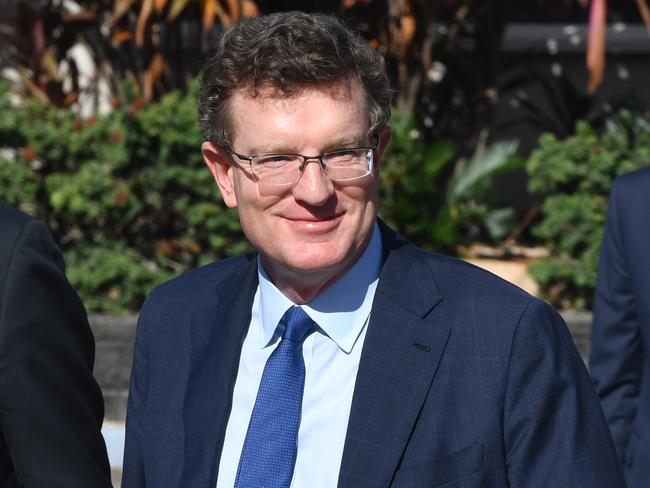Opinion: Why you should be using cash more often
I don’t want to live in a country where cash no longer exists, writes Paul Williams. VOTE IN OUR POLL
Opinion
Don't miss out on the headlines from Opinion. Followed categories will be added to My News.
Politicians often say they don’t want to live in a resource-rich nation like Australia if we can’t, or won’t, manufacture “things”.
Australia’s retreat from the car industry is a case in point.
But I’ll go one further: I don’t want to live in a country where cash – and I mean the hard currency of banknotes and coins – no longer exists to buy those “things”.
Way back in 1890 business author George McLean told us cash was king. While he was referring primarily to the dangers of credit, his aphorism is just as relevant today. Cash still opens doors.
Who would have thought, for example, that banks would get out of the cash business? Yet that’s precisely what one Australian bank is planning before year’s end. How long before the others follow?
We’ve also seen many a business become cashless because, owners say, it’s what customers want.
Really? Well, not this customer. And nor does federal Independent Member for Calare Andrew Gee, who last Monday introduced a private members bill into Parliament to keep cash alive.
While the Reserve Bank Act (1959) and the Currency Act (1965) insist hard currency remains legal tender, it’s perfectly legal for any business to refuse that currency. As the Australian Competition and Consumer Commission insists, it’s the right of every business to choose how it transacts that business.

Gee’s “Keeping Cash Transactions in Australia” Bill is therefore seeking to fine businesses up to $25,000 for refusing to accept cash for transactions up to $10,000. Interestingly, Belgium has recently passed a similar law.
But business figures are already protesting, arguing that cash-handling – currency must be counted, transported and secured – costs time and money: costs that are then passed on to the consumer.
That’s true. But it’s also true that financial institutions charge merchant fees every time we tap a card – surcharges that are also passed on to consumers to the tune of $1 billion every year. Little wonder banks want us to tap more often.
While it’s also true cash can prop up a black economy – think of tradies being paid cash-in-hand – it’s also a fact many older Australians cannot access internet banking, or just don’t trust online transactions in a scam-filled world. Many Australians, young and old, also simply dislike credit and debit cards.
As Katter’s Australian Party founder and Member for Kennedy Bob Katter – a keen supporter of Gee’s Bill – remarked this week, “Do you want your bank manager to decide whether or not you can buy a loaf of bread?”
Katter also reminded us of the fact that natural disasters in regional and remote Australia see power outages for days or even weeks at a time. How do electronic funds transfers work then? EFT machines also malfunction and banks go offline with alarming regularity, even in the city.
There’s also the point that cash is easier to manage a budget with, and to teach children the value of stretching a dollar. Where card-tapping is mindless and online statements are just numbers, there’s nothing like seeing your hard-earned moolah evaporate from your hand to make you to think more carefully about your spending choices.

And what about women who flee domestic violence? Unable to access (often joint) online accounts, cash offers imperilled women independence and safety.
Moreover, what about the cultural role our banknotes play? Since decimalisation in 1966, Australia has boasted some of the world’s most beautifully designed notes, with historical figures a testament to our unique history as a nation of writers, inventors and pioneers.
What’s to become of our national regard for Banjo Paterson and Mary Gilmore as featured on our $10 note? Or John Flynn and Mary Riebey on our $20? Or David Unaipon or Edith Cowan on our $50? Or John Monash and Nellie Melba on our $100 bill?
Are they to go the way of John McArthur, William Farrer, Caroline Chisholm, Joseph Banks, Francis Greenway, Henry Lawson, Charles Kingsford Smith, Lawrence Hargrave, Howard Florey and Ian Clunies Ross – all major historical figures from our old linen notes, but largely unknown by folk under 40.
The very real possibility of seeing Australia become entirely cashless has seen me recently change my own point-of-sale behaviour. Once a prodigious “tapper”, I’m now using cash at least half the time to send a message to retailers – and to the government and to the banks – that cash is still king.
It’s really very simple. If you want to see cash survive, start using it again. And contact your federal MP and ask them support Andrew Gee’s bill.
Paul Williams is an associate professor at Griffith University




